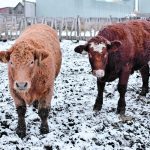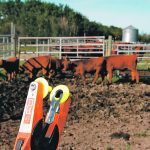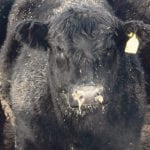Tag Archives traceability — page 2

New traceability reporting times raise concerns

Proper tagging seen as the easiest way not to lose them
Tags that go into cattle’s ears properly are more likely to stay there and not cause problems later on with traceability
The Canadian Cattle Identification Agency has launched a new campaign to provide more information to farmers on how to retain tags on cattle. The challenge with cattle tagging is that at some point in their life, animals can lose their iconic yellow button tags, and that’s a problem for the traceability system for livestock. The […] Read more
Ear tag manufacturer solves industry’s disposal problem
Dissolvable ear tags for hogs is part of a data tracking system that won a recent livestock innovation award
BRANDON — Hog producers and processors can wash away some of their traceability problems with a new ear tag that melts in hot water. It’s part of a data system that won the top livestock innovation award at the recent Manitoba Ag Days. “Those plastic tags just don’t make it through,” said Ellery Burton, developer […] Read more
Global investment in agricultural technology cools off
On the positive side, the number of venture capital firms in Canada specializing in agriculture and agri-food is growing
Two years ago, investors and venture capital firms were dumping billions into agriculture and agri-food technology. Money was flowing toward start-up companies developing plant-based “meat”, biological control of crop pests, field sensors and technology to track food back to the farm. That’s just a partial list. To generalize, ag and food tech was hot. In […] Read more
U.S. study tracks potential spread of African swine fever

Traceability gaps hurt regionalization
North America’s African swine fever strategy is based on regionalization agreements, but U.S. behind in traceability efforts
With regionalization, rather than a whole country or continent being banned from the world market, only the region in which an outbreak has occurred would face the most severe restrictions, like a ban on hog movement.
Online dashboard simplifies bin management
Tool allows connection to in-bin sensors and control devices for remote management via wi-fi or cellular networks
Saskatoon-based Adaptive Agriculture built a bin inventory system, available through its website, that connects to bin sensors and graphs their readings.
Traceability plan paid off after early misgivings

Industry introduces glass-to-the-field beer

Livestock traceability changes delayed
A strong, vigorous system remains the goal for the Canadian Food Inspection Agency to provide assurance to consumers
LONDON, Ont. — Anticipated regulatory changes to Canada’s livestock traceability system have been delayed until next year. “The earliest we will be advancing these will be in the spring of next year so we can work out any issues that remain,” said Colleen Barnes, associate vice-president of policy and programs branch at the Canadian Food […] Read more




